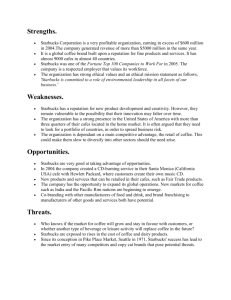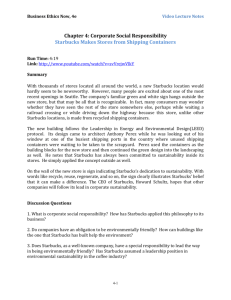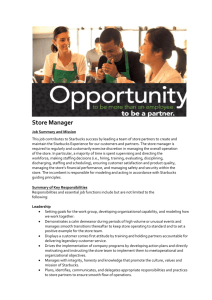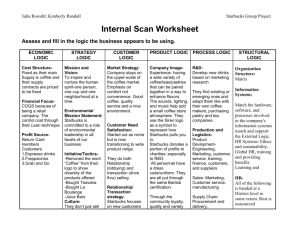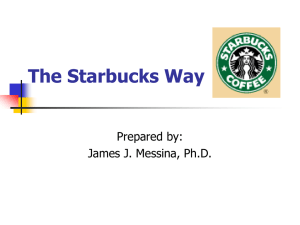Starbucks Coffee Company Policy on Corporate Political
advertisement
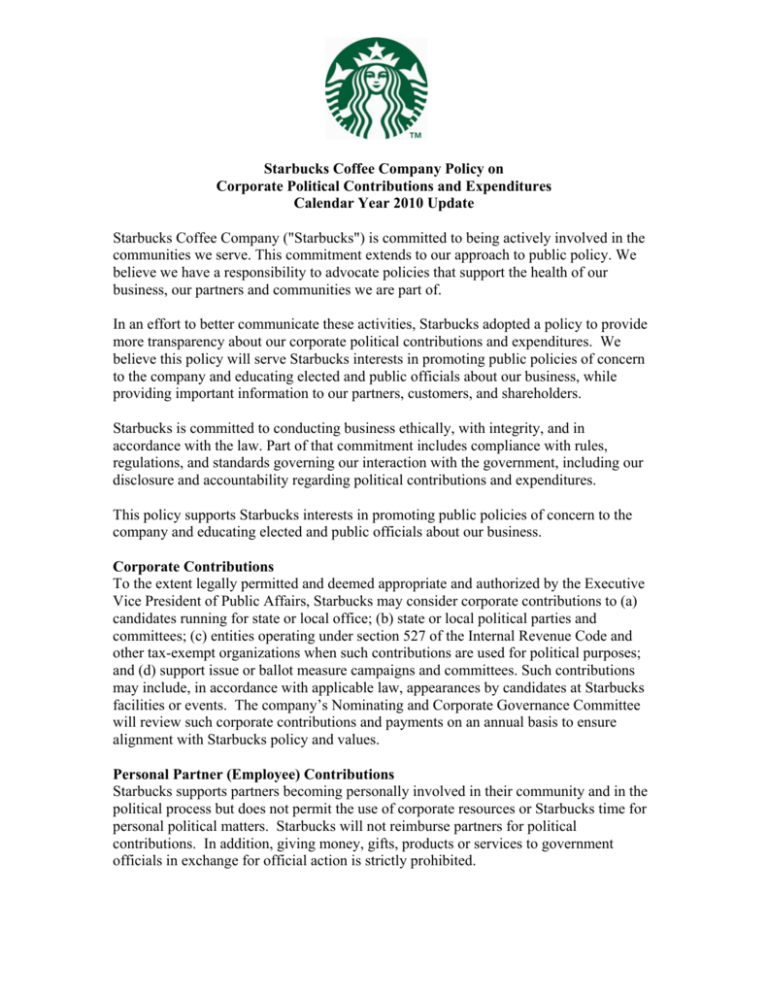
Starbucks Coffee Company Policy on Corporate Political Contributions and Expenditures Calendar Year 2010 Update Starbucks Coffee Company ("Starbucks") is committed to being actively involved in the communities we serve. This commitment extends to our approach to public policy. We believe we have a responsibility to advocate policies that support the health of our business, our partners and communities we are part of. In an effort to better communicate these activities, Starbucks adopted a policy to provide more transparency about our corporate political contributions and expenditures. We believe this policy will serve Starbucks interests in promoting public policies of concern to the company and educating elected and public officials about our business, while providing important information to our partners, customers, and shareholders. Starbucks is committed to conducting business ethically, with integrity, and in accordance with the law. Part of that commitment includes compliance with rules, regulations, and standards governing our interaction with the government, including our disclosure and accountability regarding political contributions and expenditures. This policy supports Starbucks interests in promoting public policies of concern to the company and educating elected and public officials about our business. Corporate Contributions To the extent legally permitted and deemed appropriate and authorized by the Executive Vice President of Public Affairs, Starbucks may consider corporate contributions to (a) candidates running for state or local office; (b) state or local political parties and committees; (c) entities operating under section 527 of the Internal Revenue Code and other tax-exempt organizations when such contributions are used for political purposes; and (d) support issue or ballot measure campaigns and committees. Such contributions may include, in accordance with applicable law, appearances by candidates at Starbucks facilities or events. The company’s Nominating and Corporate Governance Committee will review such corporate contributions and payments on an annual basis to ensure alignment with Starbucks policy and values. Personal Partner (Employee) Contributions Starbucks supports partners becoming personally involved in their community and in the political process but does not permit the use of corporate resources or Starbucks time for personal political matters. Starbucks will not reimburse partners for political contributions. In addition, giving money, gifts, products or services to government officials in exchange for official action is strictly prohibited. Political Action Committee Starbucks does not have a Political Action Committee (PAC). Should Starbucks decide to form a PAC, the company will update this policy to reflect that decision. Trade Associations Starbucks may communicate our positions on public policies through industry associations to which we belong in our major markets and locations. These organizations give us a collective voice with our industry partners, enabling us to reach government officials more efficiently. We will list the major associations where Starbucks pays annual dues of $50,000 or more per year on our website and update that information annually. Disclosure Starbucks annual voluntary disclosure will include the following information on the publicly available Starbucks website: a. A copy of Starbucks Policy on Corporate Political Contributions and Expenditures b. Information about our public policy agenda: Global Policy and Advocacy Focus Areas Starbucks focuses our policy and advocacy efforts around issues that have the greatest potential impact on our business, our partners (employees) and our shareholders. Our efforts are focused on the following: Environment – From recycling to global climate change, we continue to engage local, regional and national policymakers to foster the success of Starbucks aggressive environmental footprint reduction targets and create model programs and partnerships in leadership jurisdictions that are scalable to the global markets where we operate. Healthcare – Providing health coverage to our eligible full-time and part-time partners is a vital benefit. However, like other employers, we have watched health care costs continue to rise. Starbucks supports effective implementation of the healthcare reform law that will enable us to provide our partners with access to affordable quality health care. Health & Wellness – Health & wellness issues continue to be important to our customers. We continue to take steps to offer high-quality, wholesome, and nutritious foods and beverages to our customers and partners. Starbucks supports a national menu labeling program, which is simply a continuation of our ongoing efforts in this area, and we continue to look for innovative ways to make our nutritional information easier to access and understand. Tax Policy – Sound tax policy will continue to play a key role in the competitiveness of U.S.-based companies, including Starbucks. Starbucks closely monitors tax policy developments and has advocated for a tax structure that is fair and that provides incentives for job creation. Starbucks supports comprehensive tax reform that simplifies the tax system, lowers rates, and increases U.S. competitiveness. Trade Policy –Starbucks supports trade agreements and policies that help to create economic opportunities in markets either where we have – or hope to have – retail operations or buy coffee and other products. We provide input to U.S. and foreign governments on the impact specific trade agreements will have on our business by addressing barriers to U.S. exports, providing safeguards for intellectual property and trademarks, reducing customs duties, and promoting transparency on both sides of the trading relationship. Our current advocacy efforts support free trade agreements with Peru, Colombia and Korea, as well as general market access matters. c. Payments to trade associations where we are members at $50,000 per year or more, and the portions of these payments that are used for lobbying purposes. [2010 update: $0 payments to trade associations at $50,000 or higher] d. Contributions to: (a) candidates running for state or local office; [2010 update: $0] (b) state or local political parties and committees; [2010 update: $0] (c) entities operating under section 527 of the Internal Revenue Code and other tax-exempt organizations when such contributions are used for political purposes [2010 update: $0]; (d) support issue or ballot measure campaigns and committees. [2010 update: $0]
